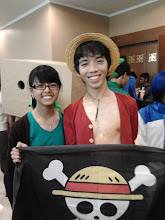 By now, it is evident that the Hallyu wave has spread worldwide, as South Korean culture has reached the hearts of those in areas like the Middle East, United States, and Europe despite differences in ethnicity and/or religion. With the help of social network services such as YouTube and Facebook, Korean pop culture has spread at a rapid pace. A report from Money Today spoke about international fans' desire to learn more about the Korean language and culture.
By now, it is evident that the Hallyu wave has spread worldwide, as South Korean culture has reached the hearts of those in areas like the Middle East, United States, and Europe despite differences in ethnicity and/or religion. With the help of social network services such as YouTube and Facebook, Korean pop culture has spread at a rapid pace. A report from Money Today spoke about international fans' desire to learn more about the Korean language and culture.Liz, the president of an unofficial UK Big Bang fan club, presides over 1,200 members. After watching G-Dragon's controversial "Heartbreaker" MV, Liz had the idol's image stuck in her head. Illustrating the extent of K-pop music's power to bring people together, Liz said, "When I search for Big Bang's videos, I know Big Bang has a lot of fans, and I get to know fans like me quickly."
It isn't just the music that drives their interest in Korean culture, either: 19-year-old Victoria developed an interest in Korean history after watching dramas. Since then, she has started to study and translate Korean, picking up on Korean arts programs and music along the way. Her interest in Big Bang began after she saw G-Dragon appear on SBS's talk show "Strong Heart", which allows stars to share anecdotes. Victoria revealed that she is interested in Korea's Chosun and Baekje Dynasties.
Many South Korean programs lack subtitles. However, international fans do not have to stay out-of-the-loop for long; an increasing number of people willing to help create English subtitles for these Korean programs are appearing.
These fans are not necessarily of Korean descent. 17-year-old Igor Rodriguez, a fan of Korean movies, shared his story: A group of 10 students in his high school expressed their desires to learn and study the Korean language. Despite the high school's lack of Korean students, the 10 were able to pick up on the language by watching movies and listening to music during their meetings. Igor said, "Artists from America and Britain are also well-received, but I think it is nice that fans are willing to try other things."
Last month, Britain's Embassy of Korea Culture Council held a K-pop contest. Cheryl J. Thompson, the winner of the contest, began to learn Korean while watching the hit drama "Boys Over Flowers".
The report by Money Today mentioned how willing the UK K-pop fanbase was to accept multiculturalism. Apparently, the fanbase does not distinguish fans by race, appearance, or religion. Starting with learning phrases in Korean such as "hello," "thank you," "I love you," "friend," and "really," European K-pop fans are making an effort to learn the language.
source:
>www.koreaboo.com
>www.koreaboo.com

No comments:
Post a Comment